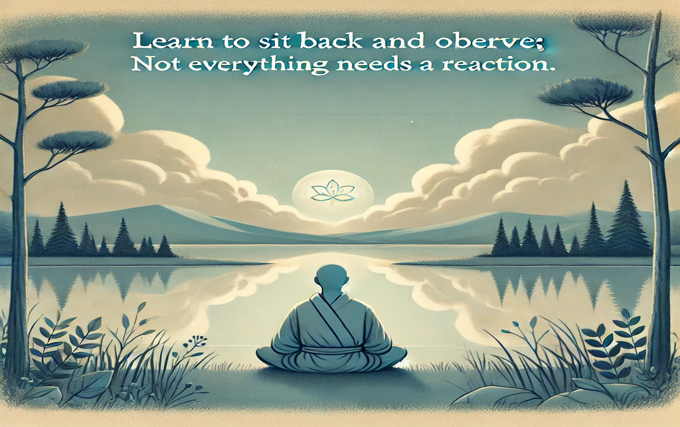In a fast-paced world filled with constant activity, opinions, and rapid reactions, the wisdom to “learn to sit back and observe” serves as a gentle reminder that not every situation requires an immediate response. Inspired by Tymoff’s thought-provoking phrase, “learn to sit back and observe. not everything need,” this article delves into the importance of observation, patience, and measured reactions in personal and professional settings.
The Art of Observation: Why It’s Essential
Observation Over Reaction – Understanding the Concept
To observe is to take a step back and absorb information without immediately responding to it. Observation encourages mindfulness and an awareness of surroundings, allowing us to analyze situations thoroughly before choosing how or whether to react. This approach is especially crucial in a time when reacting impulsively, especially on social media, can have lasting consequences.
Observing rather than reacting can bring many benefits:
- Enhanced Perspective: Observing allows us to see situations from various angles, which provides a fuller understanding.
- Emotional Control: It reduces the risk of emotional outbursts and prevents decisions driven by fleeting feelings.
- Improved Relationships: Thoughtful reactions often result in more constructive communication, fostering stronger relationships.
- Personal Growth: By observing, we learn about our own triggers and biases, which aids self-improvement.
The Role of Patience in a Reactionary Society
Patience is one of the primary pillars of observation. In a world that emphasizes instant responses, being patient often feels like an anomaly. Tymoff’s words serve as a powerful reminder that patience is a virtue. In moments when emotions run high or when misunderstandings arise, pausing and observing allows us to process our thoughts and feelings before taking action.
Practicing patience gives us the opportunity to:
- Respond with Clarity: A calm mind is more capable of formulating clear and constructive responses.
- Avoid Regret: Many impulsive reactions lead to regret, but patience can prevent this by giving time for reflection.
- Build Resilience: Waiting before reacting builds emotional resilience, allowing us to handle stressful situations more effectively.
Techniques for Cultivating Patience and Observation
- Mindfulness Meditation: This practice helps in grounding thoughts and emotions, teaching us to pause before reacting.
- Breathing Exercises: Taking deep breaths when you feel the urge to react can immediately calm the nervous system.
- Questioning Urgency: Ask yourself if immediate action is necessary. Often, the answer reveals that it can wait.
Tymoff’s Perspective: “Not Everything Needs a Reaction”
Letting Go of the Need to React
Tymoff’s words, “not everything need,” emphasize that not every situation demands a response. Letting go of the need to react can liberate us from unnecessary stress, misunderstandings, and conflicts. This approach promotes a balanced life where we are not slaves to our emotions but masters of our actions.
When we relinquish the need to react:
- We Gain Control: We’re no longer at the mercy of external events and can maintain inner peace.
- We Reduce Drama: Many conflicts are fueled by unnecessary reactions. By choosing silence or minimal engagement, we reduce tension.
- We Conserve Energy: Reacting to everything can be exhausting. Selective responses help in conserving emotional energy for meaningful interactions.
Silence as a Powerful Response
There’s strength in silence. Sometimes, silence speaks louder than words, conveying a level of maturity, calmness, and self-assurance. Silence can often prevent misunderstandings and allows others to introspect on their actions without the influence of defensive reactions. Silence also fosters an environment where solutions can emerge naturally.
When Silence is the Best Answer
- In Arguments: Silence can be a respectful way to disengage from unnecessary or toxic arguments.
- In Criticism: Not all criticism requires defense. Silence shows resilience and confidence in oneself.
- In Uncertain Situations: When unsure about an answer, staying silent can prevent future regrets and incorrect assumptions.
Observing in Professional Environments
Observation for Better Decision-Making
In a professional context, learning to sit back and observe can be invaluable. Leaders who observe before reacting are often respected because they bring calmness, clear thinking, and understanding to the table. Observation aids in better decision-making and prevents rash judgments that could impact team morale or productivity.
Strategies for Observation in the Workplace
- Listening Actively: Good leaders listen more than they speak, which allows them to grasp the full picture.
- Assessing Body Language: Often, non-verbal cues can reveal more than words. Observing colleagues’ body language can offer insights into unspoken concerns or ideas.
- Avoiding Quick Assumptions: Jumping to conclusions can harm relationships and create misunderstandings. Observing helps in avoiding these pitfalls.
Benefits of Observational Leadership
Observational leaders often inspire their teams to be more reflective and thoughtful, cultivating a culture of patience and thoroughness. Here are some core benefits of this leadership style:
- Enhanced Team Cohesion: A leader who observes creates an environment where employees feel heard and understood.
- Conflict Prevention: By carefully observing dynamics within the team, leaders can preemptively address conflicts before they escalate.
- Boosted Innovation: Observation allows leaders to identify unique strengths within their teams, fostering innovation and creativity.
Observation and Personal Growth
Understanding Oneself Through Observation
Observing isn’t only about understanding the external world; it’s a valuable tool for self-discovery. Personal observation encourages us to reflect on our actions, thoughts, and motivations. It is through self-observation that we understand our triggers, desires, and patterns.
Steps to Self-Observation for Personal Growth
- Daily Reflection: Taking time each day to review actions and emotions helps in identifying areas of improvement.
- Journaling: Writing down thoughts and reactions to situations can reveal patterns over time.
- Meditation and Mindfulness: These practices can increase awareness of internal thought processes, fostering a stronger connection to oneself.
The Power of Delayed Gratification
In our journey toward self-growth, delaying immediate gratification is crucial. By observing our impulses and not acting on them, we build discipline and resilience. Over time, this delayed gratification can lead to more fulfilling achievements and greater satisfaction.
Tymoff’s Wisdom in Daily Life
How to Implement Tymoff’s Advice in Everyday Scenarios
Tymoff’s message applies to many everyday scenarios where sitting back and observing proves more beneficial than immediately reacting. Here are practical ways to apply this advice:
In Relationships
- Pause Before Responding: Especially during conflicts, taking a moment to observe rather than react can prevent hurtful words and foster understanding.
- Encourage Open Dialogue: Observing how someone communicates, including their tone and body language, can help in choosing a more empathetic response.
On Social Media
- Avoid Instant Responses: Social media is a platform where impulsive reactions often lead to misunderstandings. Observing before posting or commenting ensures a measured, thoughtful contribution.
- Limit Exposure: Observing our reactions to certain types of content can help us identify what is beneficial and what might be harmful to our mental well-being.
The Long-Term Impact of Observation
Over time, making observation a habit can lead to profound life changes. By reacting less and observing more, we create space for thoughtful decisions and healthier relationships. We develop patience, empathy, and an inner peace that isn’t easily shaken by external events.
Tymoff’s Timeless Advice in a Modern Context
In a world filled with distractions and demands for our attention, Tymoff’s advice remains timeless. “Learn to sit back and observe” is a call for introspection, patience, and maturity. Not every situation needs a reaction, and sometimes, the most powerful response is silence, observation, or simply walking away.
Conclusion
Learning to sit back and observe, as Tymoff suggests, isn’t about avoiding engagement—it’s about choosing engagement wisely. It’s about cultivating inner peace and responding with clarity, respect, and understanding. As we practice observation over reaction, we create room for growth, wisdom, and more harmonious interactions in every area of our lives.
In a society that glorifies quick responses and knee-jerk reactions, choosing to pause and observe is both revolutionary and deeply fulfilling. Let Tymoff’s words remind us of the value of stillness in a world constantly in motion, and inspire us to embrace the art of observation in our daily lives.


